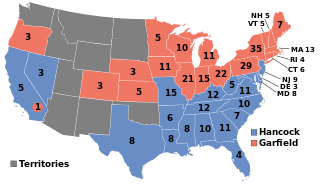
Presidential elections were held in the United States on November 2, 1880. Republican nominee James A. Garfield defeated Winfield Scott Hancock of the Democratic Party. The voter turnout rate was one of the highest in the nation's history. Garfield was assassinated during his first year in office, and he was succeeded by his vice president, Chester A. Arthur.

Presidential elections were held in the United States on November 4, 1884. Democratic Governor Grover Cleveland of New York narrowly defeated Republican James G. Blaine of Maine. It was set apart by mudslinging and personal allegations that eclipsed substantive issues, such as civil administration change. Cleveland was the first Democrat elected president of the United States since James Buchanan in 1856, the first to hold office since Andrew Johnson left the White House in 1869, and the last to hold office until Woodrow Wilson, who began his first term in 1913. For this reason, 1884 is a significant election in U.S. political history, marking an interruption in the era when Republicans largely controlled the presidency between Reconstruction and the Great Depression.
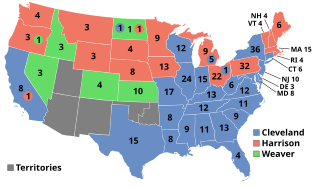
Presidential elections were held in the United States on November 8, 1892. In the fourth rematch in American history, the Democratic nominee, former president Grover Cleveland, defeated the incumbent Republican President Benjamin Harrison. Cleveland's victory made him the first president in American history to be elected to a non-consecutive second term, a feat not repeated until Donald Trump was elected in 2024. This was the first of two occasions when incumbents were defeated in consecutive elections—the second being Gerald Ford's loss in 1976 to Jimmy Carter followed by Carter's loss in 1980 to Ronald Reagan. The 1892 election saw the incumbent White House party defeated in three consecutive elections, which did not occur again until 2024.

Presidential elections were held in the United States on November 6, 1928. Republican former Secretary of Commerce Herbert Hoover defeated the Democratic nominee, Governor Al Smith of New York. After President Calvin Coolidge declined to seek reelection, Hoover emerged as the Republican party's frontrunner. As Hoover's party opponents failed to unite around a candidate, Hoover received a large majority of the vote at the 1928 Republican National Convention. The strong state of the economy discouraged some Democrats from running, and Smith was nominated on the first ballot of the 1928 Democratic National Convention. Hoover and Smith had been widely known as potential presidential candidates long before the 1928 campaign, and both were generally regarded as outstanding leaders. Both were newcomers to the presidential race and presented in their person and record an appeal of unknown potency to the electorate. Both faced serious discontent within their respective parties' membership, and both lacked the wholehearted support of their parties' organization.

The Prohibition Party is a political party in the United States known for its historic opposition to the sale or consumption of alcoholic beverages and as an integral part of the temperance movement. It is the oldest existing third party in the United States and the third-longest active party.

Neal Dow was an American Prohibition advocate and politician. Nicknamed the "Napoleon of Temperance" and the "Father of Prohibition", Dow was born to a Quaker family in Portland, Maine. From a young age, he believed alcohol to be the cause of many of society's problems and wanted to ban it through legislation. In 1850, Dow was elected president of the Maine Temperance Union, and the next year he was elected mayor of Portland. Soon after, largely due to Dow's efforts, the state legislature banned the sale and production of alcohol in what became known as the Maine law. Serving twice as mayor of Portland, Dow enforced the law with vigor and called for increasingly harsh penalties for violators. In 1855, his opponents rioted and he ordered the state militia to fire on the crowd. One man was killed and several wounded, and when public reaction to the violence turned against Dow, he chose not to seek reelection.
The 2004 Libertarian National Convention was held from May 28 to May 31, 2004, at the Marriott Marquis Hotel in Atlanta, Georgia. The delegates at the convention, on behalf of the U.S. Libertarian Party, nominated Michael Badnarik for president and Richard Campagna for vice president in the 2004 presidential election. The convention was televised nationally on C-SPAN.

The 1860 Democratic National Conventions were a series of presidential nominating conventions held to nominate the Democratic Party's candidates for president and vice president in the 1860 election.
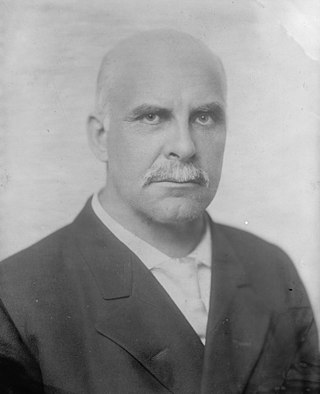
Eugene Wilder Chafin was an American politician and writer who served as the Prohibition Party's presidential candidate during the 1908 and 1912 presidential elections. He was active in local politics in Wisconsin, statewide elections in Wisconsin, Illinois, and Arizona, and campaigned throughout the United States and the world in favor of the prohibition of alcohol.
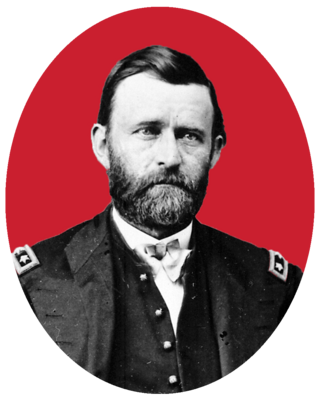
The 1868 Republican National Convention of the Republican Party of the United States was held in Crosby's Opera House, Chicago, Cook County, Illinois, on May 20 to May 21, 1868. Ulysses S. Grant won the election and became the 18th president of the United States.

James Black was an American temperance movement activist and a founder of the Prohibition Party. Black served as the first presidential nominee of the Prohibition Party during the 1872 presidential election.

William Daniel was an American politician from the state of Maryland. A lawyer, he was a noted prohibitionist and abolitionist. He served in both houses of the Maryland state legislature, first as a Whig, and later as a member of the American Party. Later, as a Republican, he was a member of the convention that wrote Maryland's constitution in 1864. He helped found the Maryland Temperance Alliance in 1872 and served as its president for twelve years. Daniel was the vice presidential nominee and running mate of John St. John on the Prohibition Party ticket in the presidential election of 1884. Placing third in the election that year, he continued his involvement with the cause of temperance until his death in 1897.

Abraham Andrews Barker served as a soldier during the American Civil War, and was a Republican member of the U.S. House of Representatives from Pennsylvania.

The 1872 Democratic National Convention was a presidential nominating convention held at Ford's Grand Opera House on East Fayette Street, between North Howard and North Eutaw Streets, in Baltimore, Maryland on July 9 and 10, 1872. It resulted in the nomination of newspaper publisher Horace Greeley of New York and Governor Benjamin Gratz Brown of Missouri for president and vice president, a ticket previously nominated by the rump Liberal Republican faction convention meeting, also held in Baltimore's newly built premier Opera House of nationally well-known theatre owner/operator John T. Ford of the major Republican Party, which had already re-nominated incumbent President Ulysses S. Grant of the regular Republicans for another term.

Henry Adams Thompson was an American prohibitionist and professor who was the vice-presidential nominee of the Prohibition Party in 1880.

The 1880 Greenback Party National Convention convened in Chicago from June 9 to June 11 to select presidential and vice presidential nominees and write a party platform for the Greenback Party in the United States presidential election 1880. Delegates chose James B. Weaver of Iowa for President and Barzillai J. Chambers of Texas for Vice President.

Frederick Neal Dow was an American political activist from Maine. The son of Prohibitionist mayor and presidential candidate Neal Dow, Fred Dow served in a number of political positions during his lifetime, including in the Maine House of Representatives and as Collector of the Port of Portland. During his time in the House, he served as Speaker from 1889-1890. He helped found the Portland Club, an influential Republican all-male social club in Portland's West End. He also owned and served as editor of one of Portland's largest newspapers, the Evening Express, from 1887-1925.

The 1872 Prohibition National Convention was a presidential nominating convention held at Comstock's Opera House, in Columbus, Ohio on February 22, 1872, to select the presidential ticket for the 1872 presidential election. It was the first presidential nominating convention of the newly organized Prohibition Party and would continue nominating presidential candidates in every presidential election leading it to become the longest continuous third party in the United States.
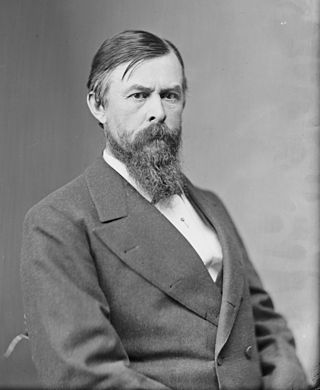
The 1876 Prohibition National Convention was a presidential nominating convention held at Halle's Hall, in Cleveland, Ohio on May 17, 1876, to select the Prohibition Party's presidential ticket for the 1876 presidential election.

The 1884 Prohibition National Convention was a presidential nominating convention held at Lafayette Hall, in Pittsburgh, Pennsylvania from July 23–24, 1884, to select the Prohibition Party's presidential ticket for the 1884 presidential election.




















